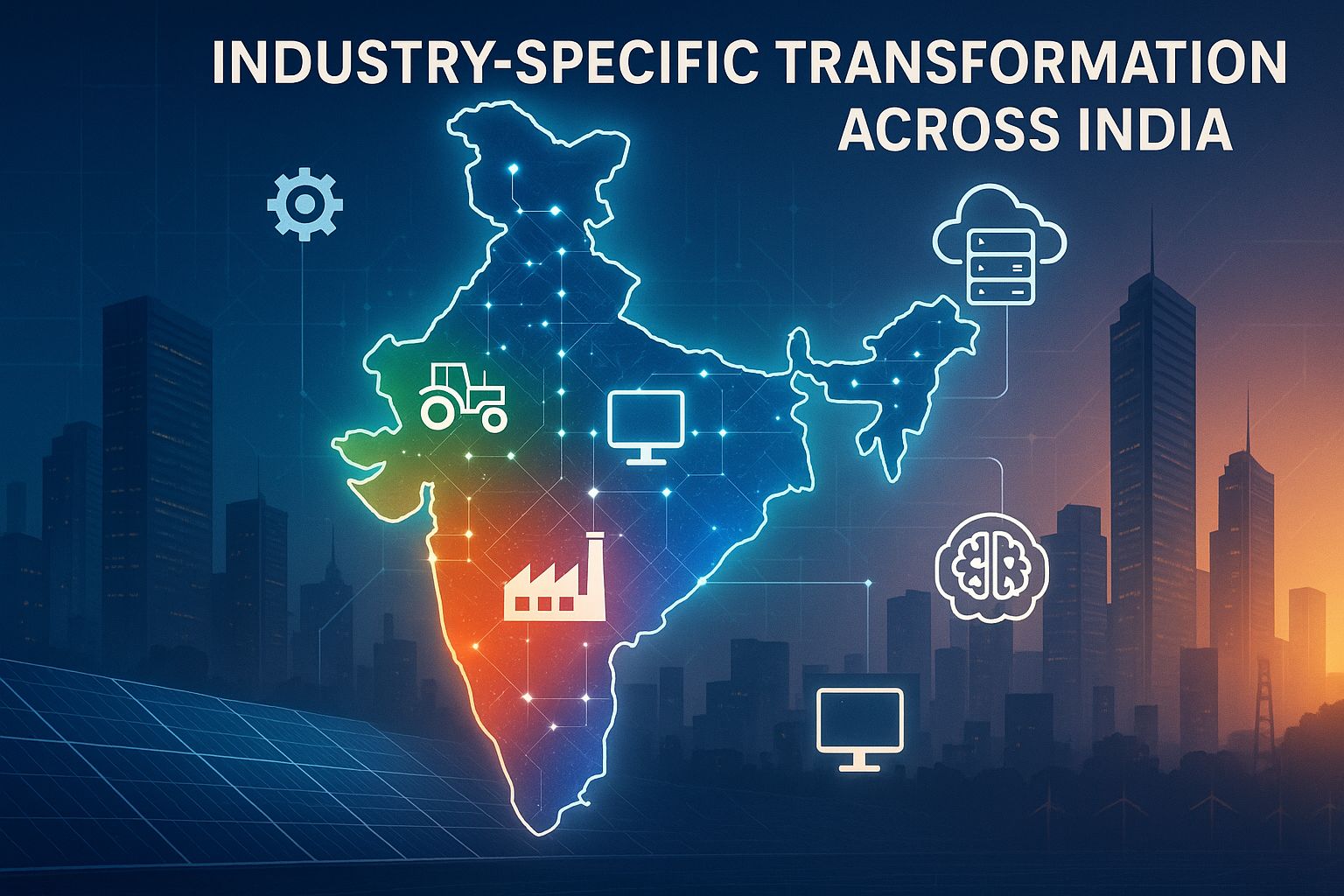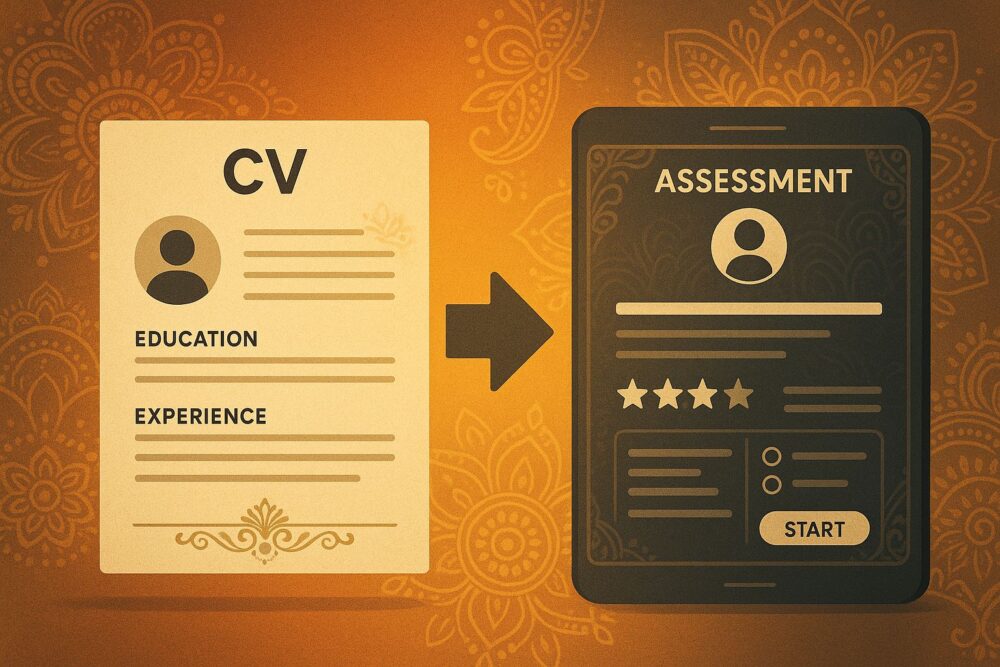India’s employment landscape is experiencing a seismic transformation that’s reshaping how companies discover, evaluate, and hire talent across the subcontinent. While job seekers have traditionally focused on crafting impressive CVs and securing strong references, a quiet revolution is fundamentally changing the rules of career advancement.
The statistics reveal the magnitude of this shift: 76% of employers in India now incorporate skills-based assessments into their hiring processes, with 71% reporting these evaluations provide more accurate predictions of job success than traditional CVs. This transformation affects everyone from fresh graduates in Bangalore’s tech hubs to experienced professionals seeking opportunities in Mumbai’s financial district.
For India’s vast workforce of over 500 million professionals, understanding this evolution from credential-based to capability-based hiring represents the difference between thriving and struggling in tomorrow’s job market.
India Jobs 2025: Why India Is Embracing Assessment-Based Hiring
Several unique factors make India particularly well-suited for the assessment revolution, while also creating urgent needs that traditional hiring methods cannot address.
The Engineering and IT Talent Pool
India’s massive technical workforce has always been evaluated based on practical problem-solving abilities rather than just theoretical knowledge. The country’s IT services industry pioneered coding assessments and technical evaluations that major global companies now adopt worldwide.
Skills over degrees mentality is already prevalent in India’s startup ecosystem, where founders and hiring managers care more about what candidates can build than where they studied. This cultural foundation accelerates assessment adoption across industries.
Educational System Challenges
Degree inflation has created situations where bachelor’s degree requirements exist for jobs that don’t actually need them. Skills assessments help employers identify capable candidates regardless of educational background, tapping into India’s enormous pool of practical talent.
Rote learning limitations in traditional Indian education don’t always develop the critical thinking and problem-solving abilities modern employers need. Assessment tools reveal these capabilities more effectively than academic transcripts.
Regional education variations mean that a degree from one state or institution may not accurately represent capability compared to another. Skills tests provide standardized evaluation regardless of educational background.
Demographic Advantages
Young workforce energy: With a median age of 28, India’s workforce is naturally more comfortable with digital assessment platforms and technology-based evaluation methods.
Multilingual capabilities: India’s linguistic diversity creates natural advantages in cross-cultural communication and adaptability traits that personality assessments can effectively identify and measure.
Entrepreneurial mindset: The growing startup culture emphasizes practical skills and results over credentials, aligning perfectly with assessment-based hiring principles.
Industry-Specific Transformation Across India
 Different sectors throughout India are implementing assessment strategies tailored to their unique requirements and market dynamics.
Different sectors throughout India are implementing assessment strategies tailored to their unique requirements and market dynamics.
Information Technology and Software Services
Coding assessments have become standard practice across India’s IT corridor from Bangalore to Hyderabad. Companies like Infosys, TCS, and Wipro use programming challenges that reveal actual development capabilities rather than relying on computer science degrees alone.
Problem-solving simulations help identify candidates who can handle the complex, ambiguous challenges common in software development and system integration projects.
Cultural intelligence testing has become crucial as Indian IT professionals increasingly work with global teams, requiring assessment of cross-cultural communication and collaboration abilities.
Financial Services and Banking
Mumbai’s financial sector increasingly uses personality assessments to identify candidates with strong ethical reasoning and risk management orientation essential for compliance and investment roles.
Analytical thinking tests help banks and financial institutions identify candidates capable of handling complex financial modeling and market analysis regardless of their educational background.
Customer service orientation assessments are particularly valuable in India’s growing fintech sector, where companies need professionals capable of serving diverse customer bases with varying financial literacy levels.
Manufacturing and Automotive
India’s manufacturing belt from Gujarat to Tamil Nadu uses skills simulations to identify candidates capable of maintaining quality standards and adapting to rapidly evolving production technologies.
Safety orientation assessments help identify workers with strong attention to detail and risk awareness crucial for India’s growing automotive and chemical industries.
Leadership potential evaluation through personality tests helps identify candidates suitable for supervisory and management roles in India’s expanding manufacturing sector.
Healthcare and Pharmaceuticals
Medical skills simulations help evaluate practical capabilities beyond theoretical knowledge, particularly important as India becomes a global healthcare services hub.
Empathy and communication assessments identify healthcare professionals capable of providing compassionate care to India’s diverse patient populations.
Stress management evaluation helps identify candidates capable of handling the high-pressure environments common in India’s rapidly expanding healthcare infrastructure.
Education and Training
India Jobs 2025: Teaching effectiveness assessments go beyond subject knowledge to evaluate communication skills, patience, and cultural sensitivity crucial for India’s diverse educational landscape.
Learning agility tests help identify educators capable of adapting to rapidly changing educational technologies and methodologies.
Regional Variations Across Indian Markets
India’s diverse regional economies are adopting assessment-based hiring at different rates and with distinct characteristics.
Bangalore – The Silicon Valley of India
Tech-first mentality makes Bangalore companies early adopters of sophisticated assessment tools including AI-powered evaluations and virtual reality simulations.
Startup culture influence spreads assessment-based hiring practices from tech companies to other industries throughout Karnataka.
Global collaboration focus drives demand for cultural intelligence and communication assessments as Bangalore-based teams work with international partners.
Mumbai – Financial and Entertainment Capital
Financial sector leadership in assessment adoption influences hiring practices across Mumbai’s diverse business ecosystem.
Bollywood and media industry applications of personality testing for creative roles and cultural fit evaluation.
Multicultural workforce management requires sophisticated assessment tools to build effective teams from India’s most diverse urban population.
Delhi NCR – Government and Corporate Hub
Government modernization initiatives slowly incorporate assessment principles into public sector hiring, though traditional methods still dominate.
Corporate headquarters of multinational companies drive sophisticated assessment adoption across the National Capital Region.
Educational institution density creates both opportunities and challenges as assessment-based hiring competes with degree-focused traditional hiring.
Chennai – Detroit of India
India Jobs 2025: Automotive industry influence spreads manufacturing-focused assessment practices throughout Tamil Nadu’s industrial corridor.
Engineering talent concentration makes technical skills assessment particularly advanced and sophisticated.
Port city international exposure drives demand for cross-cultural competency evaluation and global business skills assessment.
Pune – Education and IT Hub
Research and development focus requires assessment tools that identify innovation potential and creative problem-solving abilities.
Educational institution collaboration with industry creates unique opportunities for skills-based evaluation programs.
Automotive and IT convergence drives demand for interdisciplinary skills assessment and technological adaptability evaluation.
Skills Assessment Types Popular in India

Indian employers are implementing diverse assessment strategies that reflect the country’s unique talent landscape and business requirements.
Technical Skills Evaluations
India Jobs 2025: Coding challenges remain the gold standard for software development roles, with platforms like HackerRank and CodeSignal becoming household names among Indian IT professionals.
Engineering problem-solving assessments evaluate practical application of technical knowledge across India’s diverse engineering disciplines.
Data analysis simulations test real-world analytical capabilities essential for India’s growing data science and analytics sectors.
Language and Communication Assessment
English proficiency evaluation measures business communication capabilities essential for India’s global services industry.
Multilingual communication testing identifies candidates capable of serving diverse domestic and international customer bases.
Cross-cultural communication assessments evaluate ability to work effectively across India’s linguistic and cultural diversity.
Personality and Behavioral Evaluation
Conscientiousness measurement identifies candidates with strong work ethic and attention to detail valued across Indian business culture.
Stress management assessment evaluates resilience and performance under pressure common in India’s fast-paced business environment.
Team collaboration evaluation measures ability to work effectively in India’s relationship-oriented business culture.
Cognitive Ability Testing
Logical reasoning assessment measures problem-solving capabilities essential for India’s complex business challenges.
Numerical reasoning evaluation tests analytical thinking crucial for finance, engineering, and data analysis roles.
Learning agility measurement identifies candidates capable of adapting to India’s rapidly evolving economic landscape.
Preparing Indian Professionals for Assessment Success
India Jobs 2025: Success in India’s evolving job market requires strategic preparation that goes beyond traditional CV optimization and interview practice.
Understanding Indian Assessment Preferences
India Jobs 2025: Practical skills demonstration resonates with Indian employers who value results over theoretical knowledge, reflecting the country’s business pragmatism.
Cultural context awareness helps candidates understand how Indian business values like respect for hierarchy and relationship-building influence assessment interpretation.
Technology comfort is essential as Indian companies increasingly use digital assessment platforms that require basic technical proficiency.
Skills Development Strategies
India Jobs 2025: Continuous learning mindset becomes crucial in India’s rapidly changing economy where new skills emerge constantly and traditional knowledge quickly becomes obsolete.
English communication enhancement remains important for Indian professionals seeking opportunities in global companies or international markets.
Cross-cultural competency development provides advantages in India’s diverse business environment and growing international business connections.
Problem-solving practice through coding challenges, case studies, and analytical exercises builds capabilities that assessments effectively measure.
Assessment Preparation Techniques
India Jobs 2025: Authentic self-presentation works better than attempting to manipulate assessment results, as Indian employers value genuineness and cultural fit.
Practice with assessment formats builds comfort and confidence without compromising authenticity or cultural values.
Stress management skills help candidates perform optimally during assessments while maintaining the composure valued in Indian business culture.
The Impact on Indian Education and Training
India Jobs 2025: The shift toward assessment-based hiring is influencing educational institutions and training providers throughout India.
Traditional Education Adaptation
India Jobs 2025: Engineering colleges are incorporating more practical, hands-on learning to prepare graduates for skills-based evaluation methods.
Business schools are emphasizing soft skills development and real-world problem-solving over theoretical knowledge memorization.
Professional courses are focusing on demonstrable competencies rather than certificate accumulation.
Alternative Learning Pathways
Coding bootcamps and intensive skills programs are gaining recognition as legitimate alternatives to traditional computer science education.
Online learning platforms like BYJU’S and Unacademy are developing assessment-aligned curricula that prepare learners for skills-based evaluation.
Industry certifications from companies like Google, Microsoft, and Amazon are becoming more valuable than traditional academic credentials for many roles.
Skills Development Infrastructure
India Jobs 2025: Government initiatives like Skill India are aligning with assessment-based hiring trends by focusing on practical competency development.
Private training providers are developing specialized programs that prepare candidates for specific assessment types and industry requirements.
Corporate universities are investing in assessment-based learning and development programs for their existing workforce.
Legal and Cultural Considerations in India
India Jobs 2025: Assessment-based hiring in India must navigate complex legal requirements and cultural sensitivities.
Regulatory Compliance
India Jobs 2025: Equal employment opportunity laws require that assessment tools don’t discriminate based on caste, religion, gender, or regional origin.
Data protection requirements under India’s Personal Data Protection Bill affect how assessment results are collected, stored, and used.
Labor law compliance ensures that assessment practices align with India’s employment regulations and worker protection standards.
Cultural Sensitivity
India Jobs 2025: Caste and regional neutrality requires careful assessment design to avoid inadvertent bias based on cultural background or geographic origin.
Religious accommodation ensures assessment practices respect India’s diverse religious beliefs and practices.
Family and social considerations acknowledge the role of family input in career decisions prevalent in Indian culture.
Future Trends in Indian Assessment-Based Hiring
India Jobs 2025: Understanding emerging trends helps Indian professionals and employers prepare for continued evolution in talent evaluation.
Technology Integration Advances
India Jobs 2025: Artificial intelligence adoption in assessment tools provides more sophisticated evaluation capabilities while reducing human bias.
Mobile-first assessment platforms accommodate India’s high smartphone adoption and varying internet connectivity across different regions.
Regional language support makes assessment tools accessible to India’s diverse linguistic population beyond English speakers.
Industry Evolution
India Jobs 2025: Startup ecosystem growth will continue driving assessment innovation and adoption across traditional industries.
Manufacturing digitization requires new assessment tools that evaluate technological adaptability and digital literacy.
Services sector expansion creates demand for soft skills assessment and cultural intelligence evaluation.
Strategic Recommendations for Indian Stakeholders
India Jobs 2025: Success in India’s assessment-driven job market requires coordinated action from multiple stakeholders across the employment ecosystem.
For Job Seekers
India Jobs 2025: Skills development priority over credential accumulation aligns with evolving employer preferences and economic realities.
Technology proficiency building ensures comfort with digital assessment platforms and online evaluation methods.
Cultural intelligence enhancement provides advantages in India’s diverse business environment and global marketplace.
Continuous learning commitment becomes essential for career longevity in India’s rapidly evolving economy.
For Employers
India Jobs 2025: Assessment tool selection should consider Indian cultural context, linguistic diversity, and local business practices.
Training investment for hiring managers ensures effective assessment interpretation and bias avoidance.
Gradual implementation allows for cultural adaptation and process refinement before full deployment.
Legal compliance monitoring ensures assessment practices meet Indian employment law requirements and cultural sensitivities.
For Educational Institutions
India Jobs 2025: Curriculum modernization should emphasize practical skills and competencies that assessment tools effectively measure.
Industry collaboration helps align educational programs with current employer assessment criteria and skill requirements.
Assessment integration into educational evaluation helps prepare students for skills-based employment market.
India Jobs 2025: The transformation of India’s job market through assessment-based hiring represents both a challenge and an unprecedented opportunity for the country’s vast workforce. This evolution democratizes opportunity by focusing on capability rather than credentials, potentially unleashing the tremendous talent that exists throughout Indian society.
For professionals willing to adapt and embrace skills-based evaluation, the future holds greater opportunities for merit-based career advancement. For those who resist change or cling to traditional credential-focused approaches, the evolving job market may prove increasingly challenging.
India Jobs 2025: India’s position as a global talent hub depends partly on how quickly the country’s workforce and employers adapt to assessment-based hiring practices. The evidence strongly supports this transformation as beneficial for both individuals and the broader economy.
India Jobs 2025: The future of Indian employment is being written today through the decisions professionals make about skill development and the choices employers make about talent evaluation. Those who embrace the assessment revolution will thrive in India’s transformed job market, while those who ignore it risk being left behind in an increasingly competitive and sophisticated employment landscape.






